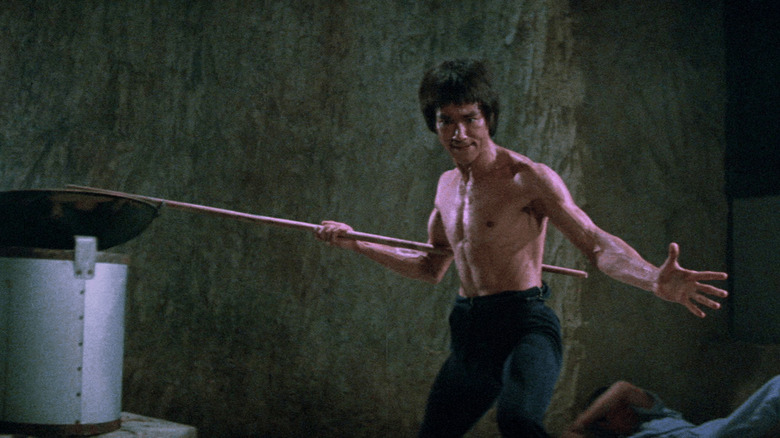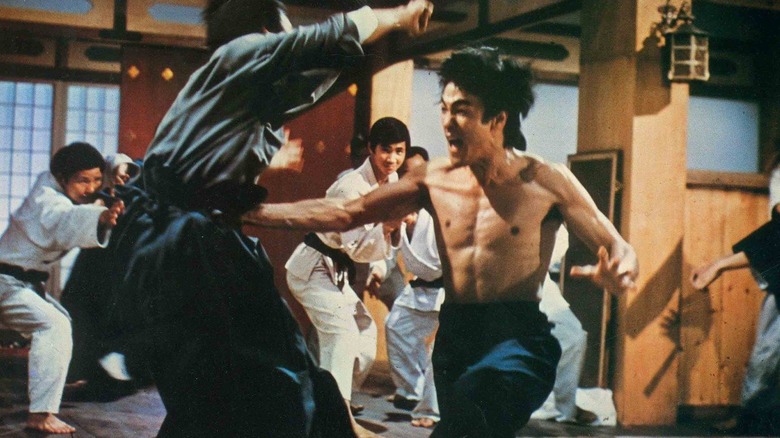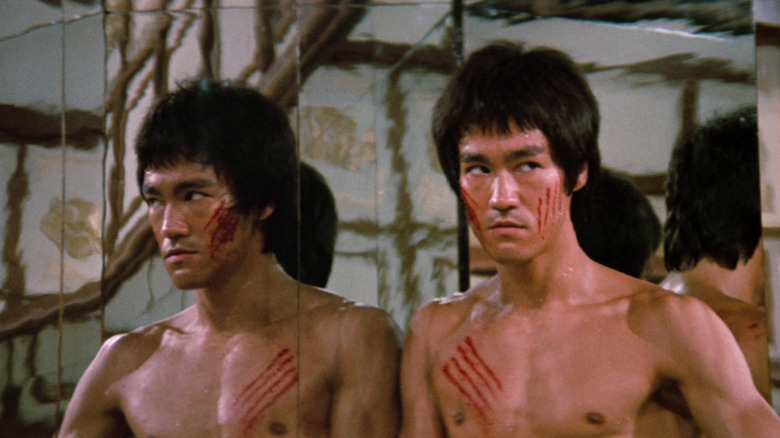Here's Why Bruce Lee Didn't Show On The First Day Of Shooting Enter The Dragon
Bruce Lee's 1973 film "Enter the Dragon" is famous for many reasons. The movie was Lee's introduction to American audiences, it inspired a wave of martial arts films in the U.S., and is known for this classic fight scene. It's also famous for a more tragic reason: For the burgeoning film star, Lee's most popular film would also be his last. Lee would not live to see the film's official release, as he died six days before "Enter the Dragon" debuted in Hong Kong.
Beyond Lee's untimely death, another shadow has been cast over the production of "Enter the Dragon." A long-standing rumor continues to cast doubt on Lee's character. Though Lee is not around to defend himself, his family has taken up the fight.
Lee's biggest fight took place off-screen
Lee was already a megastar in Hong Kong when Warner Bros. approached him with the idea for "Enter the Dragon." According to Collider, producers initially agreed to include the martial arts star in the screenwriting process. But Lee's ideas were drastically different from what Warner Bros. had in mind, leading to a behind-the-scenes battle as intense as any fight from the film.
Lee's daughter, Shannon, writes about Lee's battle to make the film in her book "Be Water, My Friend: The Teachings of Bruce Lee." She explains how Lee negotiated in good faith to make the film with his revisions. When Warner Bros. refused the changes, Lee didn't show up for the first day of filming. In response, the studio reportedly fabricated stories about Lee being so nervous about being in the movie that he was terrified to show up to the set.
Lee's widow, Linda Lee Cadwell, corroborated the story at a press junket for the 40th anniversary of the film:
"I think it's been portrayed that [Bruce Lee] was very nervous before filming began [on 'Enter the Dragon']. I think it's been misrepresented to the point that some people say he was having a nervous breakdown he was so paralyzed by fear. That is false. He was a professional actor. He'd been acting his whole life. And he was a professional martial artist as well. So he had no butterflies about that kind of thing. But what he wanted was to make this film very special. And he had ideas he would like to see added to the script. He was very adamant about it. He really put a lot of work into studying how to improve this film. To make it the best product that it could be because this was an important film for Bruce. It was going to be his first introduction to the American market. There was some reticence on the side of the people making the film. They wanted Bruce to get on the set and get going but he didn't want to show up and get going on the film until the things he wanted — namely all the philosophy –- in the film were done."
The standoff between Lee and Warner Bros. lasted for two weeks, until the studio finally caved and incorporated Lee's changes. What resulted is considered one of the most influential martial arts films of all time. So what would the film have looked like without Lee's input?
Your typical American action film
Lee's family explains that Lee re-wrote the original "Enter the Dragon" script to show the Western world the beauty of gung fu — and no, that's not a typo: Gung fu is a specific style of martial arts. In fact, Lee wrote a book about it, entitled "Chinese Gung Fu: The Philosophical Art of Self-Defense." Lee also wanted to express himself as an on-screen representation of a Chinese man in an era in which Hollywood had little interest in casting Chinese actors as Chinese characters.
None of this was included in the original Warner Bros. script. As Lee's daughter writes:
"This original script had none of the iconic scenes that exist today. No 'finger pointing at the moon.' No 'art of fighting without fighting.' No philosophical scene with the monk discussing the true nature of mastery — 'I do not hit. It hits all by itself.'"
So basically, it would have been a typical American action film. To underscore this further, the studio liked either "Blood and Steel" or "Han's Island" for the movie's title. But part of the concessions from their standoff was changing the name to "Enter the Dragon."
Despite Lee's longing to be a Hollywood star, he risked it all by facing off with the studio to honor his art and pave the way for successive Chinese actors. His daughter writes in her book, "He knew that if he didn't take a stand, he would be marginalized over and over again by people who 'knew better.'" It turns out Lee's most epic battle didn't take place in front of the camera, but rather behind it.


